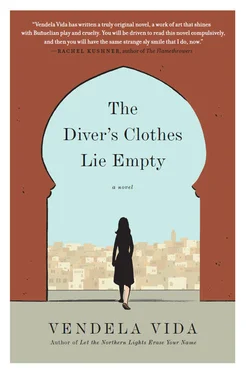The midwife took the baby and counted ten toes and ten fingers. “It’s a beautiful girl,” she said. There was a snipping of the umbilical cord — your sister held the scissors — which was more painful than you expected. You thought the cord was not capable of sensing anything, but as she severed the cord your stomach felt as though it had been punctured by a knife. And then you were told you would have to wait for the placenta to come.
You assumed that would be easy; you had been told it would be just like menstruation — that something would slide out of you and you would be done. But it was like another child! Was it another child? You asked the midwife. With fertility treatments weren’t multiples more likely? And besides, your sister’s egg had been used and you were twins. An idea passed through your mind, an idea that had never occurred to you before but now seemed brilliant: if there were two babies, maybe you could keep one? You knew better than to voice this thought.
No, it wasn’t another baby, you were told. It was the placenta. “The afterbirth,” the midwife called it. And then you were pushing all over again, pushing this dreaded afterbirth out of you. “It’s done,” the midwife said.
It was over. It was done. And all you could hear were cries. Her cries. They were so soft. You looked at the midwife and doula, these women who had seen you at your most bare and compromised moment. You stared at your sister, not believing the intimacy you had all shared. You felt tears rolling down your cheeks and you knew they were tears of exhaustion, and tears of disappointment: you wished you had never dreamed of the possibility of giving birth to twins.
“This is the biggest gift you could ever give someone,” your sister’s husband said to you as he held the little baby girl. Their daughter. Not yours. Theirs.
You thanked him for thanking you and he laughed and told you that you should not be the one saying thank you.
Because the birth took place at a hospital, a nurse was required to be present in addition to the midwife and doula. The nurse wore blue scrubs and white puffy Reeboks. She carried the baby to the scale and recorded her weight, and then, using a floppy tape measure that she stretched from heel to crown of head, announced her length. The nurse in the Reeboks carried the baby back to the side of the bed where you were recuperating. She held her out for you and your sister to see. “She is exquisite . She looks like Cleopatra,” the nurse said.
The nurse was about to hand the baby to you when your sister intercepted. “I think it’s for the best if you don’t hold her,” she said to you.
While the film crew is adjusting the lighting you are thinking about this, all of this — the pastel flowers, your shoulder wet with your sister’s tears, the body pillow, the burning sensation. You are sitting on the floor of the mosque, rocking back on your heels, with each of your palms over the opposite arm’s elbow. You hear sobbing and only after a minute do you realize that it’s you who’s sobbing. You are the one making the wailing sounds. You open your eyes.
You notice something happening on the set around you. Or rather, you notice the absence of anything happening and your ears sense the unusual quiet. You look to your right and see the director has loosened his vise grip on his head and is staring at you. For the first time since you were introduced, he’s really looking at you as a person and not as a stand-in.
“I’m sorry,” you mumble. You know you’ve been distracted; you know you’ve done something wrong. No one has been this silent on set before. You wipe your face. You reposition your palms.
Now the director is talking seriously with the famous American actress. They are both staring at you. You are certain you will be fired.
You do not know what you will do for work, how you will get home. You love this job, you realize. You turn your head away. Tears don’t return to your eyes, but you feel they’re close. You pray in earnest— please do not let me lose this job —and again there is quiet all around you.
The director is staring at you.
He walks over to you. “Can I have a word?” he says.
You start to stand. You wobble with trepidation. The mosque is silent, reverential toward the punishment he is about to bestow upon you.
“No, please, don’t get up,” he says. You sit on the prayer rug and he sits down with you.
“That was fantastic,” he says. “Stunning.”
You murmur thank you, afraid he’s being facetious.
He tells you he’s told the famous American actress she can take a few lessons from you on how to cry.
You ask him if he really told her that.
“Of course.”
Oh no, you think.
He asks you to go through the scene again, the stage directions as they’ve given them to you, but the emotions as you’ve chosen to portray them.
You do seven more takes as they adjust the lights, and then the cameras. With each new take you recall more details. You think of your sister’s plea to you, her comment about the hatchet job of the abortion, the doctor’s balled-up examination gloves, the insemination under bright lights, the classical music that played too loudly in your sister’s husband’s car as they drove you the hospital, the bright headlights of the oncoming cars, the sight of the mattress on the floor, the sensation of the baby trying to crawl through your spine, the white nightgown you planned to wear for delivery that eventually ended up in the sink of the bathroom when you were moved to the shower, your sister’s incompetent massaging of your back, your waters breaking, the burning the burning the burning, your sudden and bizarre wish to be pregnant with twins, the cutting of the umbilical cord, the lemonade the doula brought you after the delivery.
When they’ve figured out the lights — very complicated in the mosque — and the cameras, it’s the famous American actress’s turn to inhabit the role of Maria. You wipe your eyes as you walk off set, and the wardrobe woman embraces you. You accept her long hug. You inhale the scent of her hair — ripe pears and cigarette smoke.
The famous American actress walks right by you and onto the set. You do not talk the rest of the day. You try not to watch as the director becomes increasingly frustrated with her performance during the scene. It occurs to you that until now, everything you have done, the actress has done after you, and has done it better. But now the director is asking her to emulate you. It’s so painful you can’t bear to watch, and instead look at your knees during each successive take, which becomes increasingly more difficult to endure for everyone around.
Finally, at 6 P.M. the practical secretary approaches you. “I think you need to go back to your hotel and get ready now,” she says. “If you want to be on time, which I expect you do.” You had forgotten about the date.
She slips you an envelope. “It’s an advance on this week’s payment,” she says. “We want to make sure you have money in case you need it for any reason tonight. Leopoldi is a gentleman, but we don’t want. . a situation.”
You don’t ask her what kind of situation she might be talking about. You don’t want to know. You carefully take the envelope from her hands. It’s heavier than you expected and you try not to let surprise, or even delight, overtake your face.
The driver takes you back to the hotel. You’re tempted to open the envelope while in the van, but you know he can see you in the rearview mirror. You have to be cautious, cool. You run your hands through your hair; you’re still wearing the wig. You’ll have to remember to bring it back the day after tomorrow, when you film again. He lets you off and tells you another driver will be picking you up at 7:30.
Читать дальше












